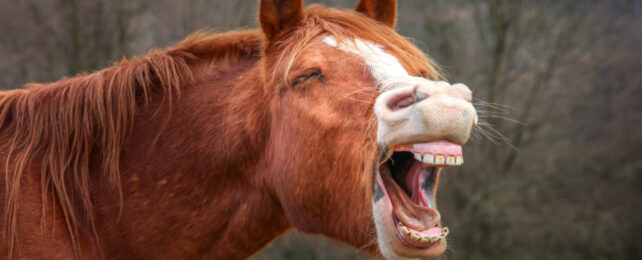Horses participating in a new experiment revealed an unexpected level of smarts by appearing to strategically ignore game rules to reap the most treats for the least amount of effort.
"Horses are not natural geniuses," says Carrie Ijichi, an equine scientist at Nottingham Trent University in England. "They are thought of as mediocre, but this study shows they're not average and are in fact more cognitively advanced than we give them credit for."
Surprisingly few studies have been carried out on horse learning, with some research hinting at the capacity for understanding the basic consequences of their decisions.
Pondering whether the large herbivores err towards living in the moment or have an inkling of what's to come, Nottingham Trent University ethologist Louise Evans and colleagues have just demonstrated what many horse lovers may already suspect: horses can and do plan ahead.
The researchers put 20 horses to the test. The horses were offered a treat for touching a target in the form of a piece of card.
When that target was revealed alongside a light, however, this reward was not provided.
The light was meant to indicate a kind of 'stop' signal. But the horses continued to nose boop the target regardless, gobbling their treats once the light was off.
It's easy to dismiss this behavior as a failure to understand the game. But there are several alternate reasons why our trusty steeds may act this way, Evans and team explain. These include: understanding but lacking the behavioral inhibition to stop – a sign of impatience; taking longer to learn a second signal than the time they were given; or, 'cleverly' applying a cost-benefit strategy.
To distinguish between the options, the researchers introduced a cost to the experiment. The cost was a timeout – removing any possibility of a reward for a period of 10 seconds after the horse incorrectly touched the card whenever the 'stop' light was on.
"We were expecting horses' performance to improve when we introduced the time-out, but were surprised by how immediate and significant the improvement was," says Evans.
"Animals usually need several repetitions of a task to gradually acquire new knowledge, whereas our horses immediately improved when we introduced a cost for errors. This suggests that the horses knew all along what the rules of the game were."
The researchers believe their equine test subjects nudged the targets indiscriminately at first because the horses still received regular rewards without having to put in the effort to assess the light's significance. The horses seemed to use a cost-benefit approach to ignore the stop signal, but as soon as the larger cost was imposed they switched tactics, indicating a level of forward planning previously thought beyond them.
This demonstrates an ability to anticipate future events and alter their behavior to achieve their goal: in this case, more treats for minimal effort.
"We now think that horses may be able to use a form of learning called 'model-based learning' which was thought to be too complex for them. This will now help us to understand their behavior and capabilities much better," explains Ijichi.
"It's fascinating because they have a very underdeveloped prefrontal cortex which is what we typically credit with producing that type of thinking in humans. This means they must be using another area of the brain to achieve a similar result and this teaches us that we shouldn't make assumptions about animal intelligence or sentience based on whether they are 'built' just like us."
This is a common mistake we seem to have repeated across many animal species from bees to birds and primates, in part due to misguided attempts at avoiding anthropomorphizing them.
But our own mighty thinking abilities as humans did not just conveniently appear from nowhere. Their origins lie deep within our evolutionary history so we likely share many cognitive traits with a lot of other species.
By better understanding how other animals think we can strengthen our relationships with them and improve the welfare of the other life we share our planet with.
This research was published in Applied Animal Behaviour Science.
